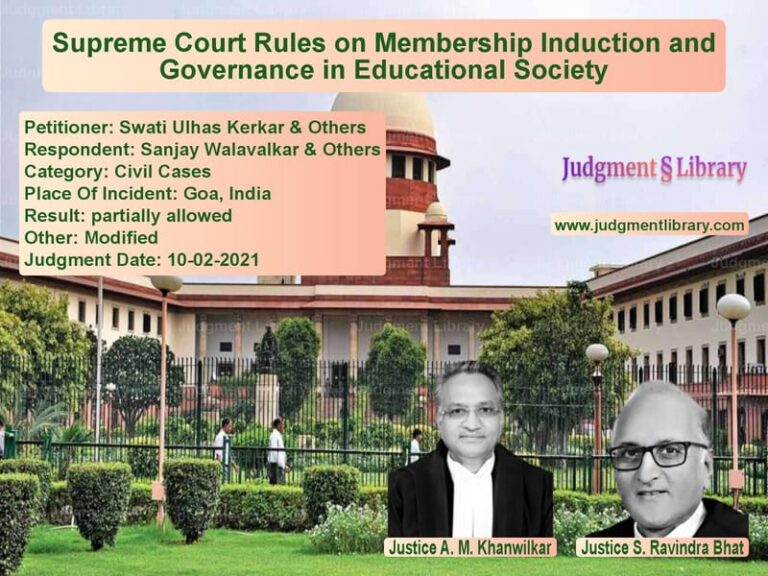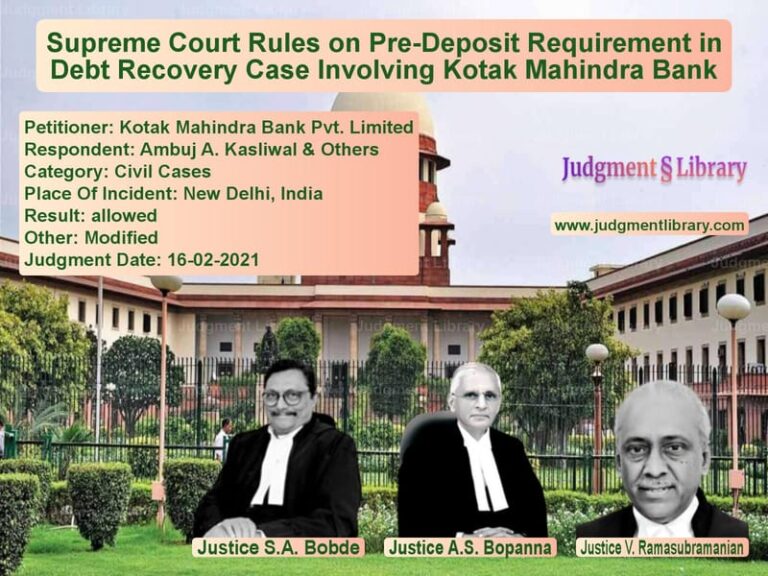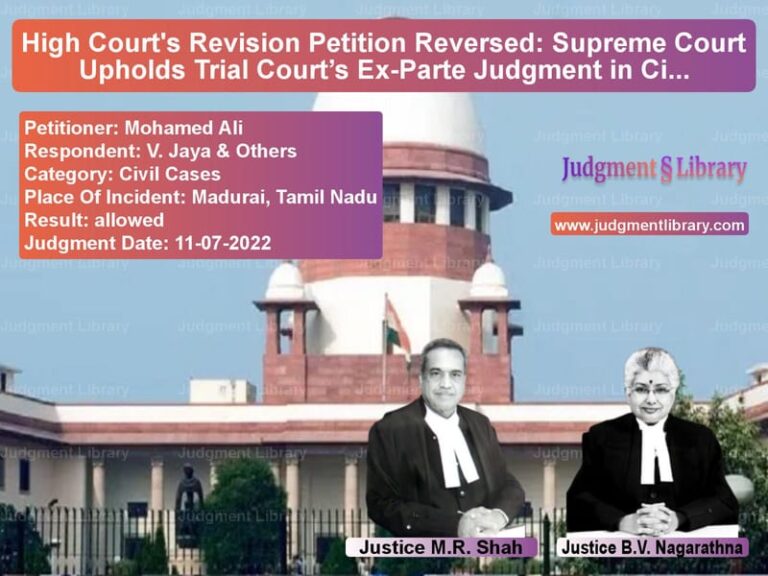Supreme Court Rules on Fee Regulation for Minority Educational Institutions in Madhya Pradesh
The Supreme Court of India recently delivered a crucial ruling in Icon Education Society v. State of Madhya Pradesh & Others, addressing the regulatory framework for fee fixation in minority educational institutions. The judgment clarified the role of the Admission and Fee Regulatory Committee (AFRC) under the Madhya Pradesh Niji Vyavsayik Shikshan Sanstha (Pravesh Ka Viniyaman Avam Shulk Ka Nirdharan) Adhiniyam, 2007 (hereafter, ‘Act of 2007’) and its applicability to minority institutions.
Background of the Case
Icon Education Society operates two unaided minority educational institutions in Indore—Indore Institute of Law and Indore Nursing College. On July 8, 2019, the AFRC, constituted under the Act of 2007, requested the Indore Institute of Law to submit a proposal for fee regulation for its law courses. The institution contested this directive, arguing that the AFRC had no authority over minority educational institutions under Article 30(1) of the Constitution.
When the AFRC rejected the institution’s objection and mandated fee fixation, the institution appealed under Section 10 of the Act of 2007. The appeal was dismissed on January 10, 2020, with the appellate authority ruling that both minority and non-minority institutions were subject to the same fee regulation framework.
The institution then challenged this decision in the Madhya Pradesh High Court, arguing that Sections 4 and 9 of the Act of 2007 violated minority rights by imposing fee regulation without distinction from non-minority institutions. The High Court dismissed the petition on November 19, 2020, citing precedent set by the Supreme Court in Modern Dental College and Research Centre v. State of Madhya Pradesh (2016).
Following this, the appellant moved the Supreme Court.
Petitioner’s Arguments (Icon Education Society)
The appellant, represented by Senior Advocate Dama Seshadri Naidu, argued:
- Minority institutions enjoy special protection under Article 30(1) of the Constitution, granting them the right to establish and administer educational institutions free from state interference.
- Sections 4 and 9 of the Act of 2007 do not differentiate between minority and non-minority institutions, thus violating constitutional protections.
- Fee regulation interferes with the autonomy of minority institutions and prevents them from setting reasonable fees that align with their financial and academic objectives.
- The decision of the High Court was erroneous in applying Modern Dental College, as that case concerned professional institutions generally and not minority-run institutions.
Respondent’s Arguments (State of Madhya Pradesh)
The State of Madhya Pradesh, represented by Additional Advocate General P.V. Yogeshwaran, countered:
- The objective of the Act of 2007 is to prevent profiteering and commercialization of education.
- Fee regulation does not violate Article 30(1) since it does not prevent minorities from establishing and administering educational institutions.
- The Act applies uniformly to all professional institutions, ensuring that students are not subjected to arbitrary or exorbitant fees.
- Regulatory oversight is necessary to maintain educational quality and fairness in fee structures across institutions.
Supreme Court’s Judgment
The Supreme Court bench, comprising Justices Dinesh Maheshwari and Sanjay Kumar, ruled that minority institutions must submit their proposed fee structures to the AFRC, which can regulate them to prevent profiteering but cannot unilaterally impose fees.
“It is not open to the AFRC to seek to unilaterally fix the fees to be charged by the appellant society for the professional courses offered through its educational institutions.”
Key Observations:
- The Act of 2007 does not empower the AFRC to arbitrarily set fees but only to review the fees proposed by institutions.
- The AFRC’s role is limited to ensuring that fees do not amount to profiteering or commercialization of education.
- Minority institutions are not exempt from fee regulation, but their right to propose fees remains protected.
- The AFRC must allow institutions to submit their proposed fees and ensure compliance with constitutional protections.
Legal Precedents Considered
The Court relied on the following precedents:
- T.M.A. Pai Foundation v. State of Karnataka (2002) – Established that fee regulation is permissible to prevent profiteering, but minority institutions retain autonomy in administration.
- P.A. Inamdar v. State of Maharashtra (2005) – Held that minority institutions can devise their own fee structure but are subject to reasonable regulation.
- Modern Dental College and Research Centre v. State of Madhya Pradesh (2016) – Upheld fee regulation mechanisms but clarified that they should not infringe on the autonomy of institutions.
Key Takeaways from the Judgment
For Minority Educational Institutions:
- Minority institutions must submit their proposed fees for review but cannot have fees arbitrarily imposed on them.
- Fee regulation is permitted only to prevent exploitation and commercialization.
For Regulatory Bodies:
- AFRC cannot dictate fees but can ensure compliance with guidelines that prevent profiteering.
- The decision reinforces the need for structured and transparent fee regulation.
For Students:
- The judgment ensures fairness in fee regulation without curtailing institutional autonomy.
- Regulatory mechanisms are upheld to protect students from exorbitant fees.
Conclusion
The Supreme Court’s ruling in Icon Education Society v. State of Madhya Pradesh clarifies that while minority institutions are not immune from fee regulation, they retain their right to propose fees. The decision balances the rights of institutions with the need for oversight to prevent commercial exploitation. The judgment sets a critical precedent in ensuring that regulatory bodies operate within their defined roles while respecting constitutional protections for minority institutions.
Petitioner Name: Icon Education Society.Respondent Name: State of Madhya Pradesh & Others.Judgment By: Justice Dinesh Maheshwari, Justice Sanjay Kumar.Place Of Incident: Madhya Pradesh.Judgment Date: 16-03-2023.
Don’t miss out on the full details! Download the complete judgment in PDF format below and gain valuable insights instantly!
Download Judgment: icon-education-socie-vs-state-of-madhya-prad-supreme-court-of-india-judgment-dated-16-03-2023.pdf
Directly Download Judgment: Directly download this Judgment
See all petitions in Fundamental Rights
See all petitions in Public Interest Litigation
See all petitions in Constitution Interpretation
See all petitions in Judgment by Dinesh Maheshwari
See all petitions in Judgment by Sanjay Kumar
See all petitions in partially allowed
See all petitions in Modified
See all petitions in supreme court of India judgments March 2023
See all petitions in 2023 judgments
See all posts in Constitutional Cases Category
See all allowed petitions in Constitutional Cases Category
See all Dismissed petitions in Constitutional Cases Category
See all partially allowed petitions in Constitutional Cases Category







